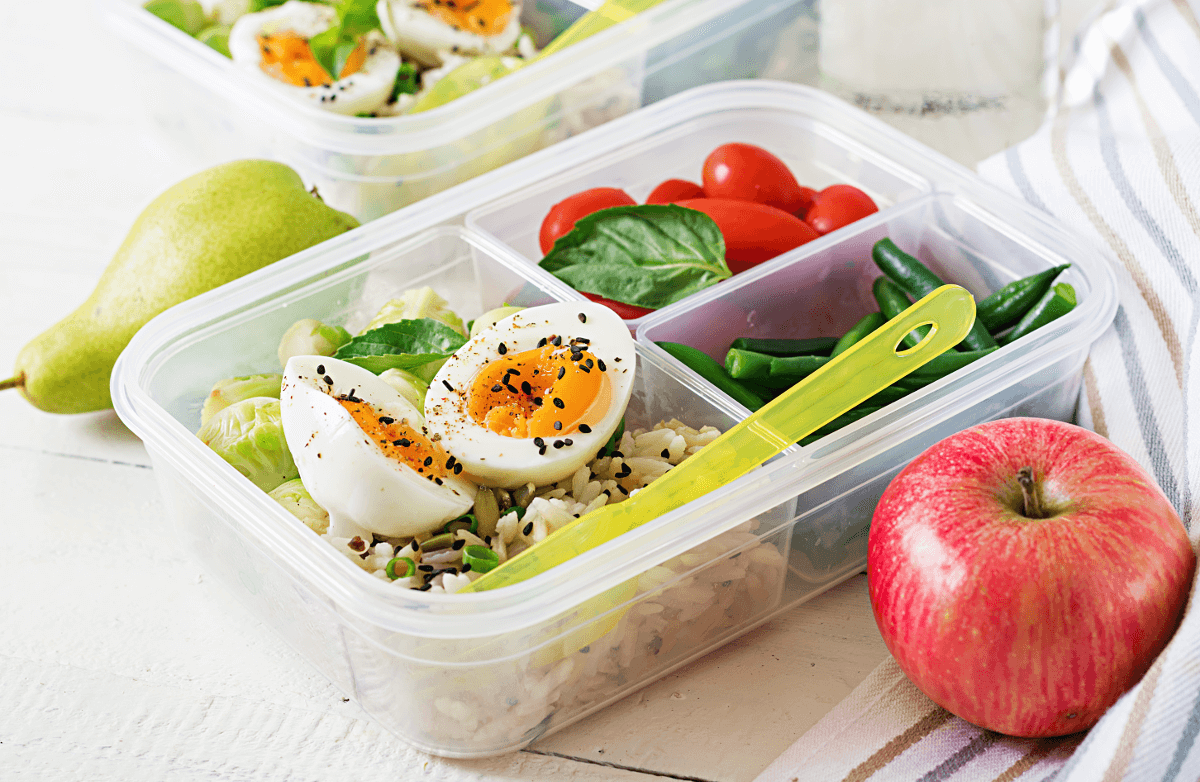
If you're looking to lose weight, meal prep is about to be
your new BFF. Planning ahead can save you from mindless munching or hitting the
drive-thru after a busy day, but it can take some time to put meals together.
Use these meal prep hacks from Registered Dietitian, Toby Amidor, to
save yourself precious time!
On its face meal planning
and prepping sounds intimidating. For many, planning just one meal is
terrifying, so the concept of shopping for, cooking, and prepping breakfasts,
lunches, dinners, and snacks for an entire week is enough to make them cringe
and grab for the nearest takeout menu.
When done thoughtfully and strategically, meal planning and prepping could be the
healthy eating hack your schedule has been seeking. Meal prepping is empowering
and can help you eat healthier even on the busiest weeknights. But eating
healthy is only the tip of the iceberg: Meal prepping can also help you save
money if you plan to repurpose ingredients from other recipes for
various meals, and if you know the exact amounts to buy of pricier ingredients
like chicken, fish, and meat. It can also help save time, especially when you
spend just one day a week cooking every week. By prepping in advance, you'll
shave off about 45 minutes from every busy workweek night so you can work out,
spend time with loved ones, or have some time for self-reflection.
Meal prepping can also help control your weight, of course. Whether you are
looking to lose weight or maintain your current weight, keeping portions in
check is one of the biggest hurdles people with weight issues struggle to
overcome. With meal prep, every week you will box each meal and snack, making
it a handy tool for managing portion control without having to think through
every single meal. You'll also be able to get more done with less effort.
Cooking a double batch and freezing half for a later date, for example, is a
great way to save "future you" time. It takes substantially less
effort to cook extra muffins or chili than it does to cook a new recipe every night
of the week, after all!
For those struggling with time management or dealing with an over-packed
schedule, meal prepping can also help decrease stress. Cooking every night,
whether for yourself or an entire family, can be extremely taxing. You need to
select a recipe to cook, have all the ingredients available, cook the dish,
serve the meal, and clean up, all after a full day of errands, work or chores.
Meal prepping allows you to skip over these steps without worrying
about that burning question that inevitably comes along every night: What's for
dinner?
But
First…
There's a lot that goes into meal planning and
prep. To avoid feeling overwhelmed before you even grab the first cooking pan,
it's important to have a strategy and understand your strengths and weaknesses
before you dive into shopping and cooking. The first thing to decide, for
example, is whether you want to cook everything in one day or break it up into two
days. Some people like to get it over with in an afternoon, but for others, the
idea of spending so much time in the kitchen is a buzzkill.
From there, determine which meals you have to prep. Do you go out with
clients for lunches or have access to healthy snacks at work? Those meals you
can skip. After you select your recipes, put together your shopping list and
check the pantry to ensure you don't accidentally rebuy an ingredient you already have.
When you're ready to start
cooking, pick the order. Slow cooker recipes should go first, then those that
take longer to cook such as lasagna or chili. If you're working toward weight
loss, your last step is to properly portion your meals out. It's a step that
people often forget, but taking the extra time to create a balanced, properly
portioned meal pays off in the end.
Master
These Meal Prep Hacks
While meal prep does require that you spend some
time in the kitchen, there are tips and tricks that work wonders to help save
time and money (and sanity) as you put together your meals. Go into it with a
good attitude, throw on some upbeat music, and think about how happy you'll be
when all your meals are prepped, delicious, and ready for you to eat and you'll
be a meal-prep fanatic in no time at all.
1. Go with the flow of the supermarket: To be the most efficient with your food shopping list, write it out the way the supermarket flows. Almost all supermarkets have you enter at the fruit and vegetable section so this is where you should start before continuing in your specific market. This way you will remember all your items and be more efficient. The worst thing you can do is forget something in aisle one when you're already in aisle 11! After a few visits you'll be an expert on where to find canned goods, meats, herbs, and other items, so taking the extra time to organize your list based on how you shop is worth the hassle you'll be saved by bopping back and forth across the store to find items.
2. Go simple to make more: The simplest dishes can be made into many
more meals, so be creative as you think about the variety in your menu.
Take grilled chicken, for example, you can add it to a sandwich, top a
salad, add it to a quesadilla, or make a chicken salad. Black beans,
steamed broccoli, quinoa or hardboiled eggs can similarly be made
in bulk and then used as the base or a complement to a larger meal.
There's nothing that sends people to the drive-thru faster than getting
bored eating the same meal three days in a row, so look for simple ways to
change things up.
3. Select easy-to-clean recipes: Who likes doing dishes? You can minimize
them by committing to cooking one of your meals in a slow
cooker. Chili, chicken and vegetables and roasts can all be prepped
beforehand and tossed in the cooker before work on Monday, then eaten
throughout the week. Thanks to a renewed interest in the trend, you can
also find many sheet pan recipes online, all of which leave you with just
one sheet pan to clean when you're done.
4. Freeze leftovers in single-serve
containers: Instead of
freezing extra food in a large container, which forces you to
defrost the entire batch when you're ready to eat, place your portion in a
single-serve container, instead. That way, you can easily defrost it
overnight and have it ready to go for lunch or dinner the next day. When you
suddenly need an extra meal during the week, you'll be happy you had the
foresight to make this simple adjustment.
5. Freeze extra herbs: To minimize food waste, do not discard any
fresh herbs leftover from this or that recipe. Instead, toss 1/3
cup of olive oil with two cups of fresh herbs in a blender and blend until
smooth. Freeze the mixture in ice cube trays and, once frozen, remove each
cube and store it in a resealable plastic bag. Label the bag with the name
of the herb and store it in the freezer for up to two months. Later, this
paste can be used as a quick way to add flavor to fish and chicken or to
make a tasty salad dressing—no extra chopping involved.
6. Stash freezer smoothies: Make prepping smoothies
even quicker by placing cut-up fruit, vegetables, and herbs in
individual resealable bags. Each bag can be stored in the freezer for up
to two months and makes for a quick and easy breakfast for those mornings
when you're running so far behind schedule. When you are
ready to make a smoothie, pull out your individual bag, place
the ingredients into the blender, add ½ to ¾ cup of your favorite liquid
(skim milk, 100 percent juice, or almond milk), blend, toss in
a to-go cup and go. Your belly will thank you for not skipping
breakfast or a snack.
7. Meal prep snacks: While snacking gets a bad rap thanks to the
idea that a good snack equals mindless munching, snacking with purpose can
help keep your body fueled between meals and effectively curb any
"hangry" cravings that send you to the first sweet or salty
snack you see in the vending machine. While there are many simple
grab-and-go foods to stock up on for healthy snacks, (think single-serve
Greek yogurt or pre-portioned nut butter packets), those items are often
overpriced for the food you get. You can easily prep a
few portion-friendly snacks to last throughout the week by buying
individual ingredients and using your own reusable containers. Try
prepping energy bites or balls, trail mix, ice pops made with Greek yogurt
and fruit, or chopped vegetables and homemade hummus.
The most
important thing to remember about meal prep is that it must suit your lifestyle
to work. If you dread cooking all your meals on Sundays, break it up by doing all
your chopping on Sunday and cooking throughout the week. If you hate the idea
of boring meals, experiment with spices or homemade condiments to make the same
meal in different ways. The only meal prep strategy that is worth following is
one that you will use. Try any or all the above hacks, a bit of trial and
error, and hold onto the tips that make your life easier so you can eat
healthier and live a less stressful life.













